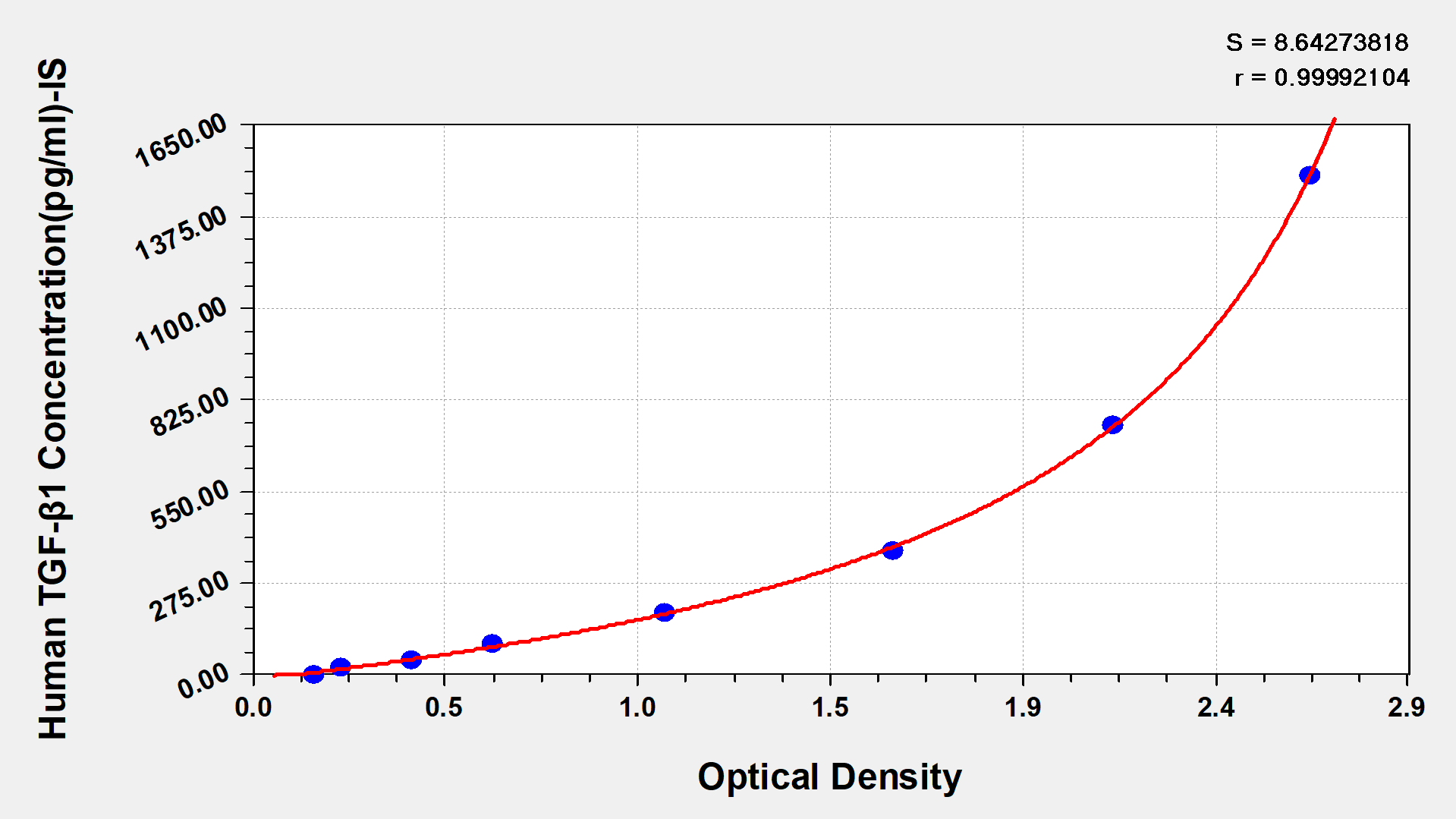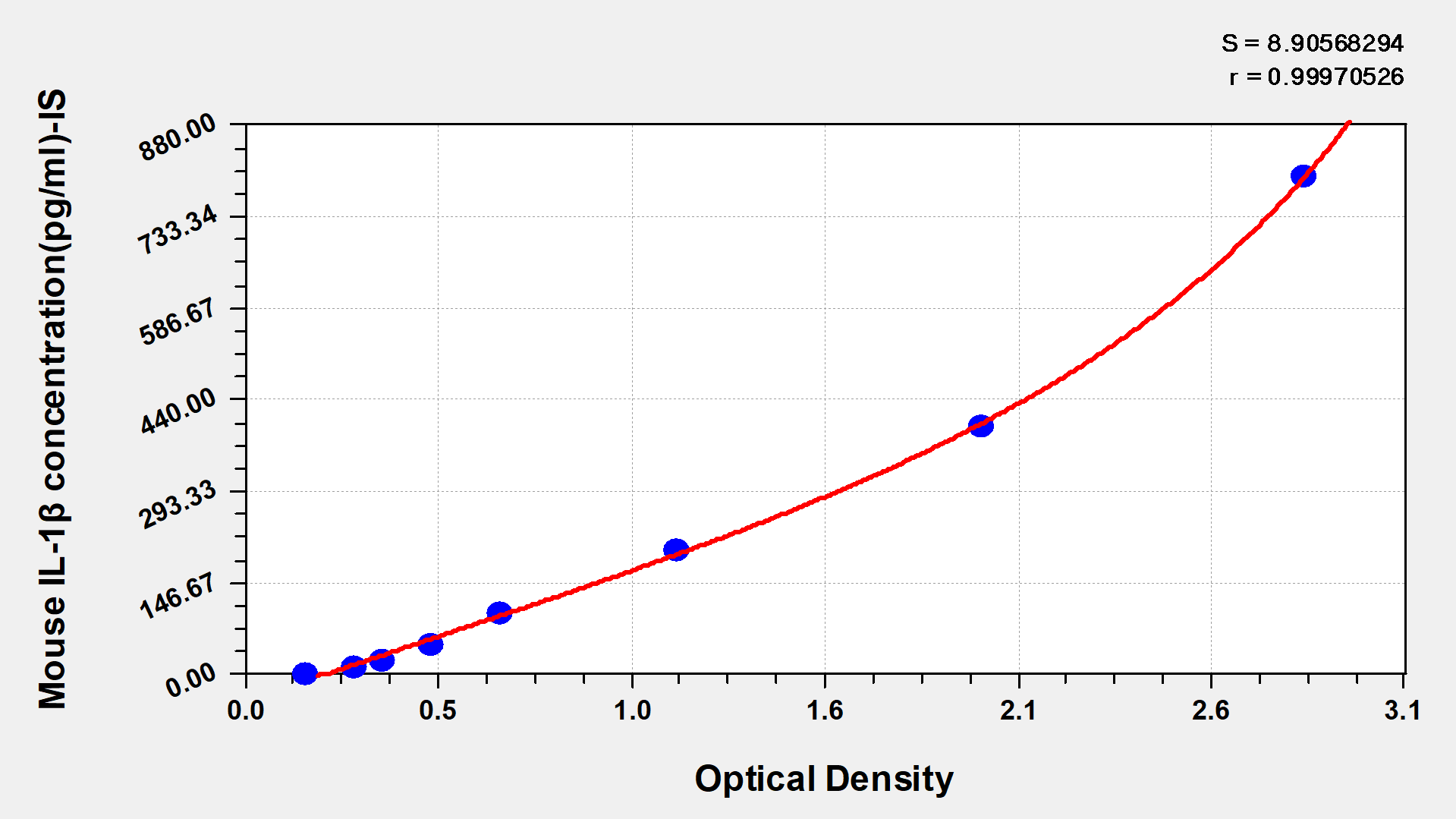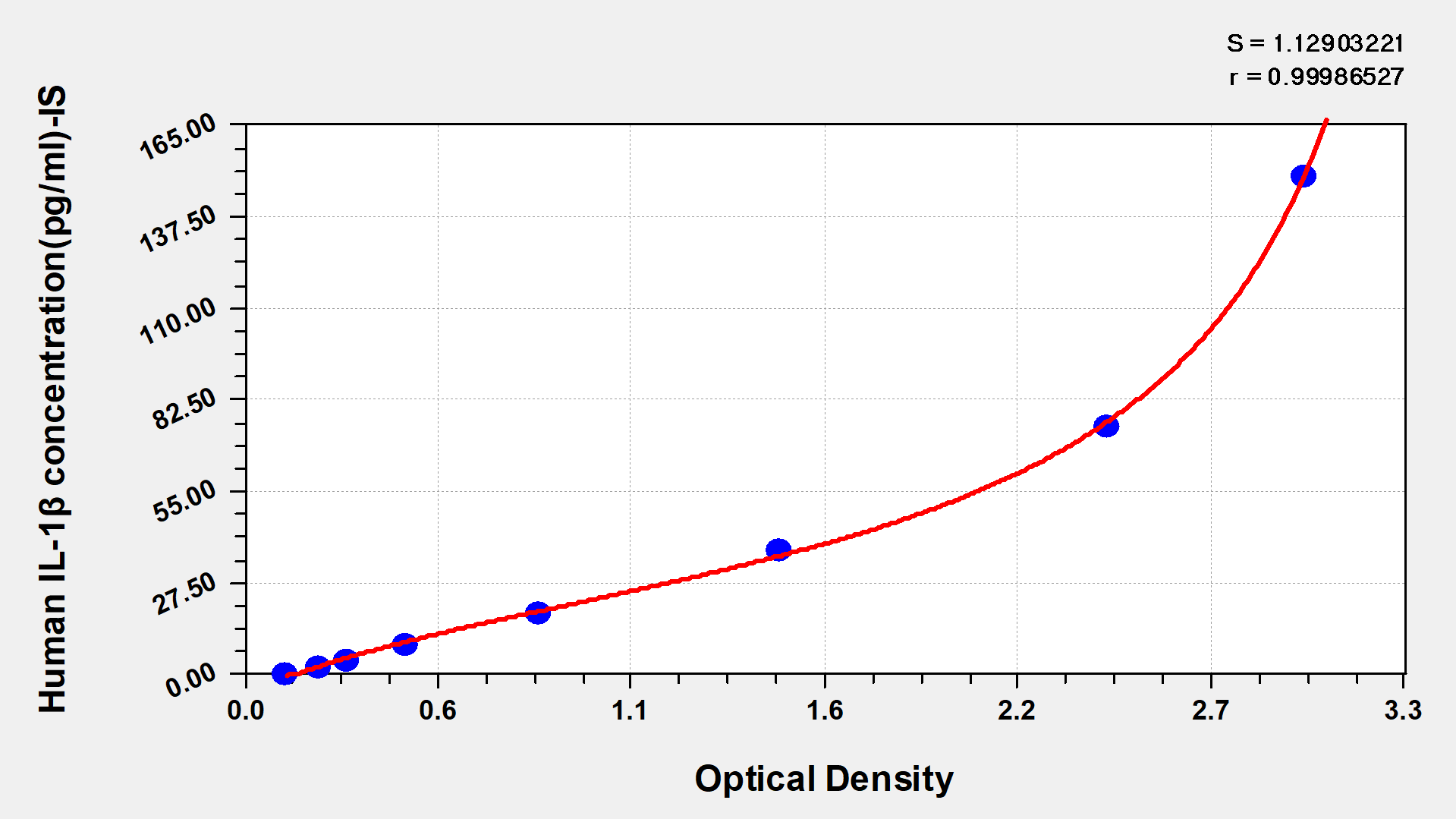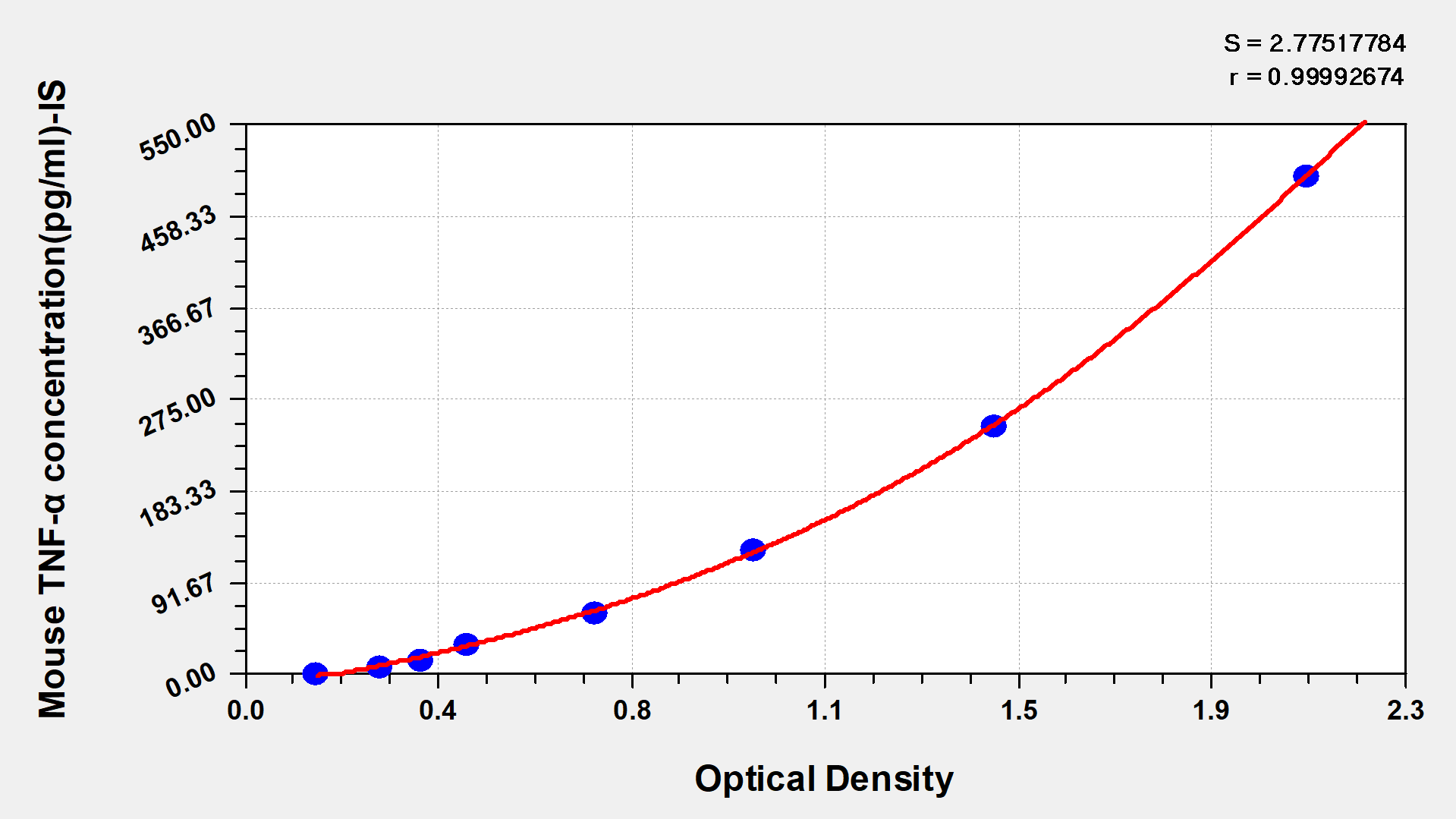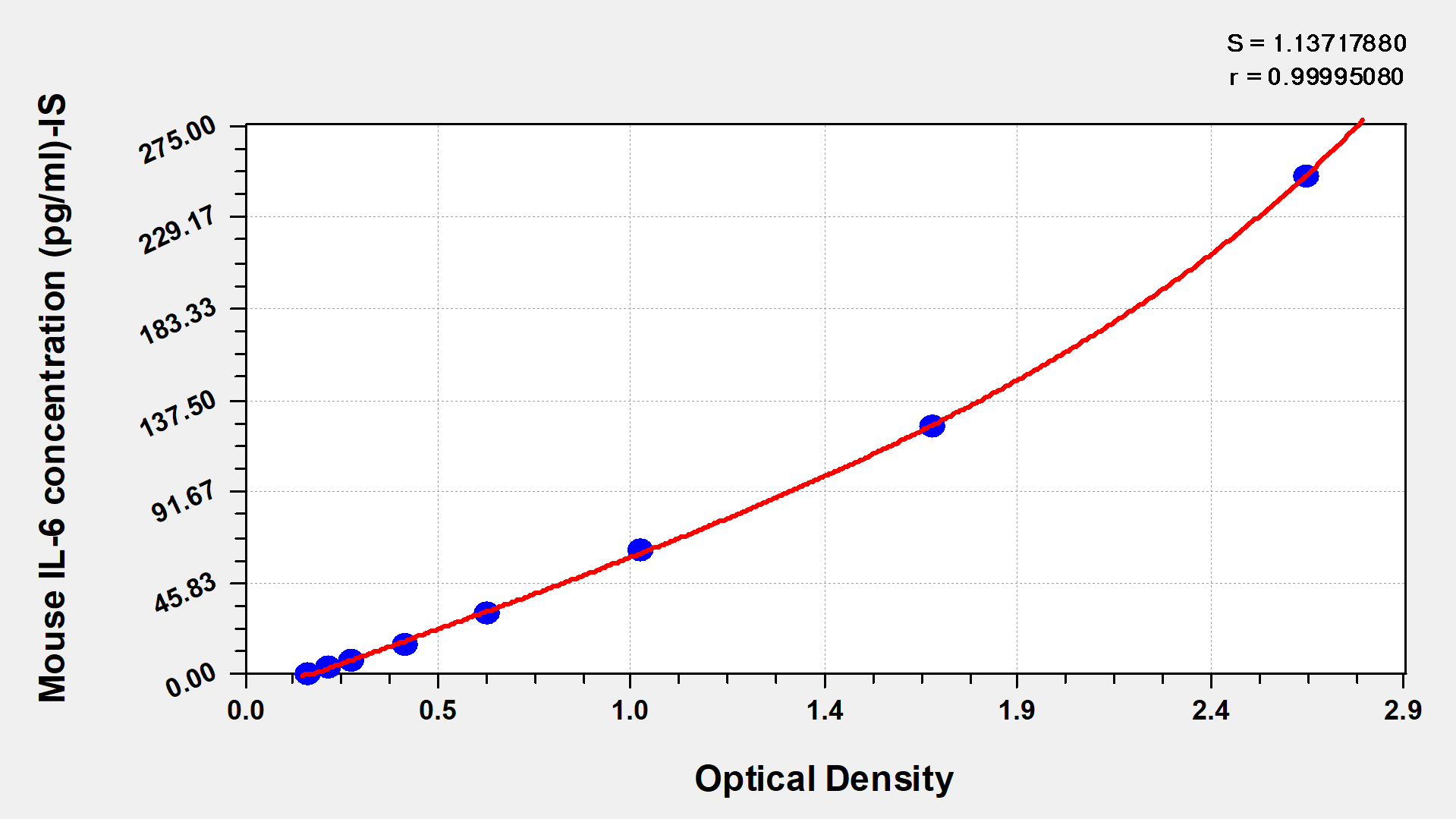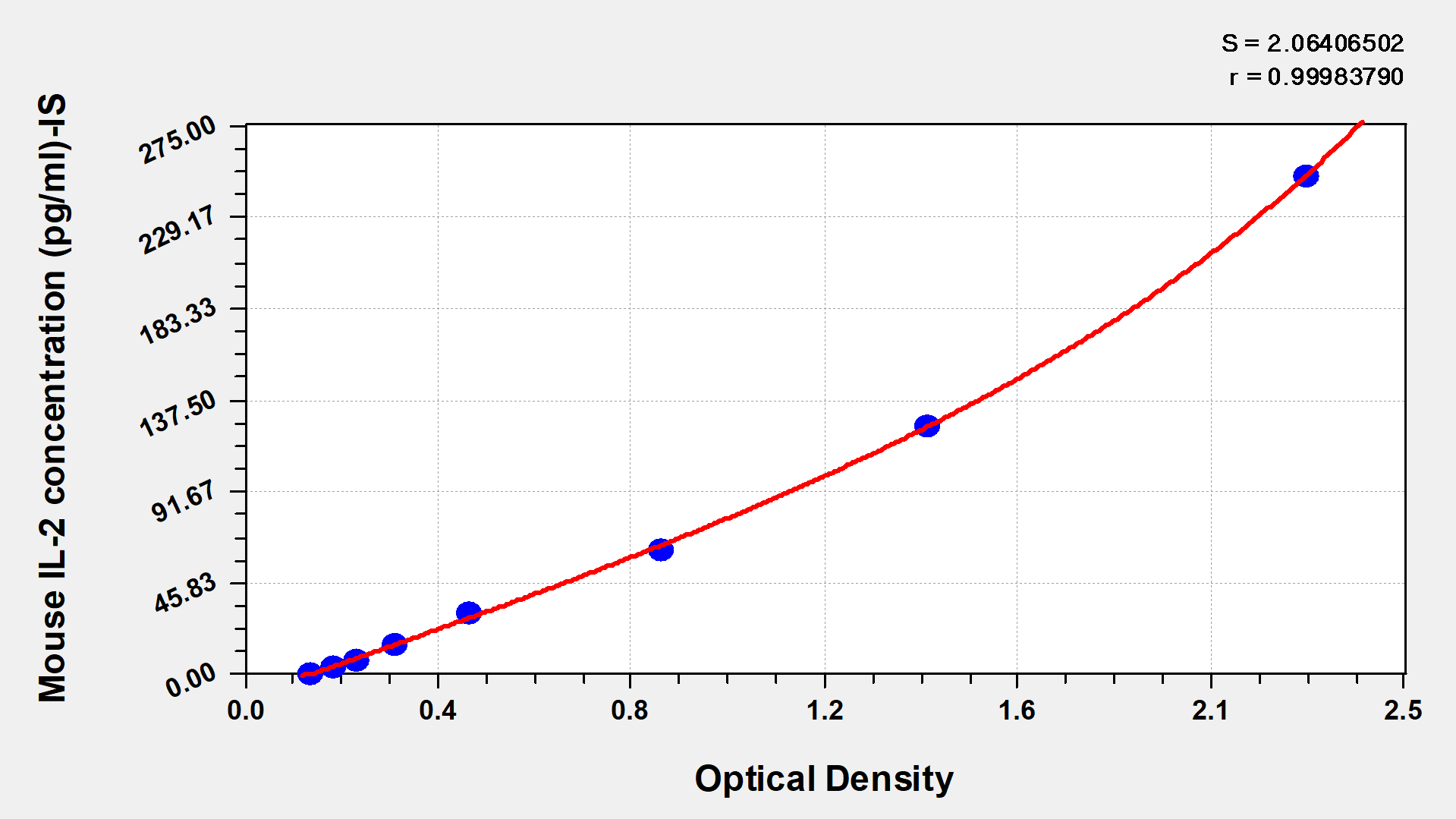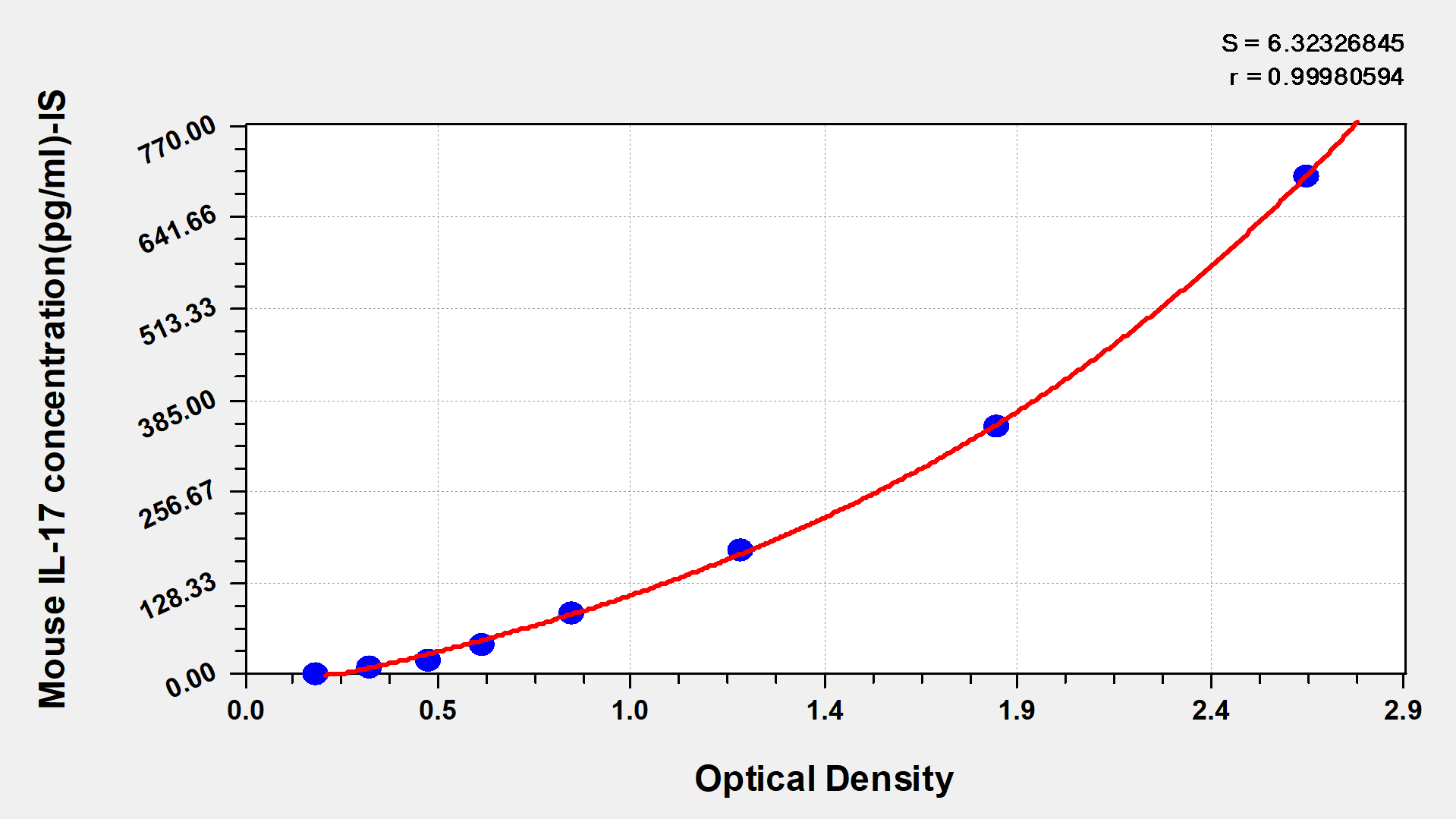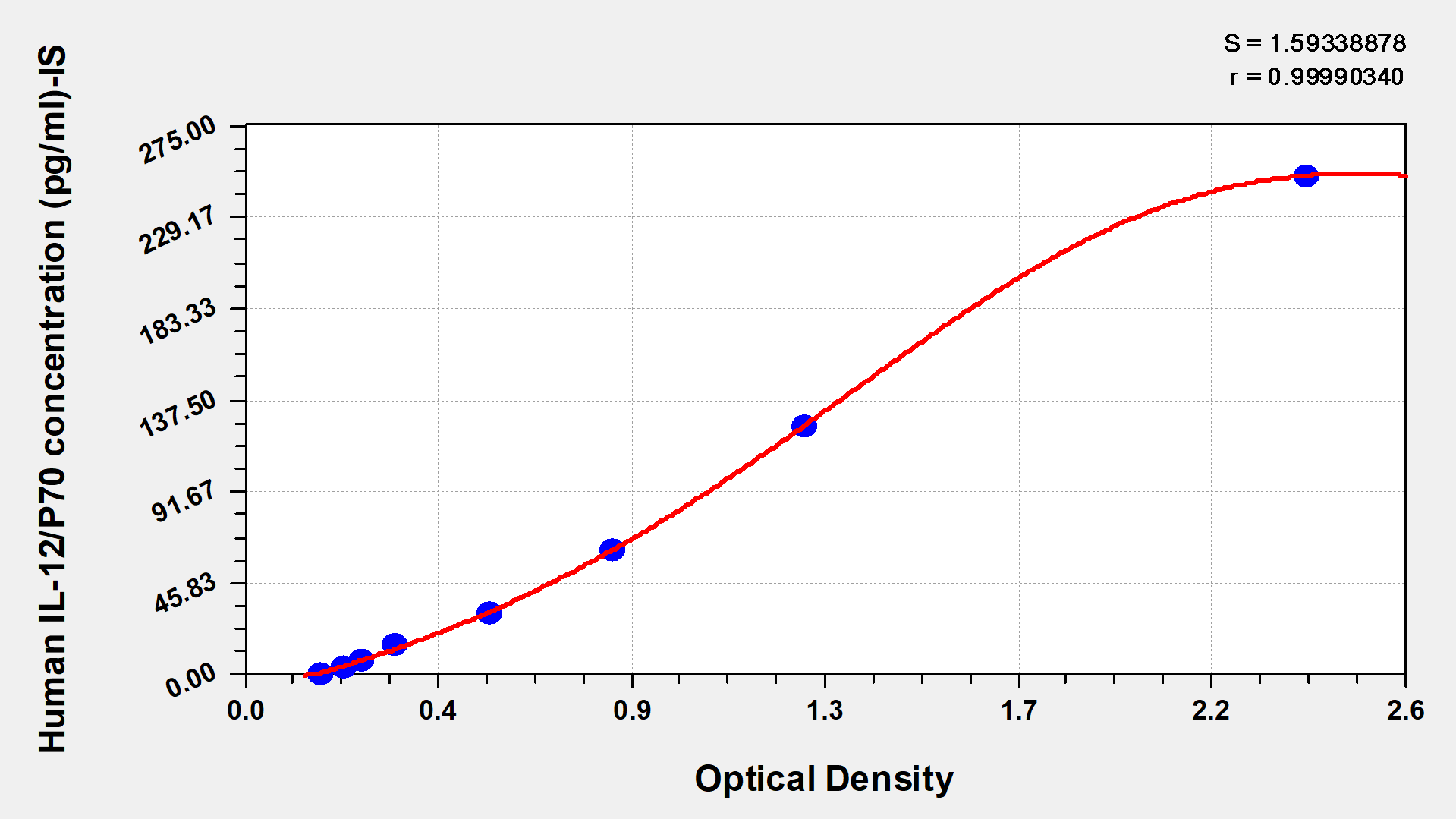-
中文名称:小鼠热休克蛋白90(HSP-90)酶联免疫试剂盒
-
货号:CSB-E08312m
-
规格:96T/48T
-
价格:¥3800/¥2500
-
其他:
产品详情
-
产品描述:小鼠热休克蛋白90(HSP-90)酶联免疫试剂盒(CSB-E08312m)为双抗夹心法ELISA试剂盒,定量检测血清、血浆、组织匀浆样本中的HSP90AA1含量。HSP90AA1 是一种重要的分子伴侣蛋白。它在细胞内参与众多信号通路和蛋白质的折叠、稳定。研究发现其与肿瘤发生发展密切相关,干扰其功能可使肿瘤相关蛋白降解,有望成为肿瘤治疗新靶点,目前对其深入研究有助于开发有效抗癌疗法。试剂盒检测范围为0.156 ng/mL-10 ng/mL,本试剂盒适用于体外定量检测小鼠来源样本,可支持基础科研中HSP - 90表达水平分析,如探究药物干预、环境胁迫或疾病模型下该蛋白的动态变化,为分子机制研究提供可靠工具。本品仅用于科研,不用于临床诊断,产品具体参数及操作步骤详见产品说明书。
-
别名:Hsp90aa1 ELISA Kit; Hsp86 ELISA Kit; Hsp86-1 ELISA Kit; HspcaHeat shock protein HSP 90-alpha ELISA Kit; Heat shock 86 kDa ELISA Kit; HSP 86 ELISA Kit; HSP86 ELISA Kit; Tumor-specific transplantation 86 kDa antigen ELISA Kit; TSTA ELISA Kit
-
缩写:
-
Uniprot No.:
-
种属:Mus musculus (Mouse)
-
样本类型:serum, plasma, tissue homogenates
-
检测范围:0.156 ng/mL-10 ng/mL
-
灵敏度:0.039 ng/mL
-
反应时间:1-5h
-
样本体积:50-100ul
-
检测波长:450 nm
-
研究领域:Neuroscience
-
测定原理:quantitative
-
测定方法:Sandwich
-
精密度:
Intra-assay Precision (Precision within an assay): CV%<8% Three samples of known concentration were tested twenty times on one plate to assess. Inter-assay Precision (Precision between assays): CV%<10% Three samples of known concentration were tested in twenty assays to assess. -
线性度:
To assess the linearity of the assay, samples were spiked with high concentrations of mouse Hsp-90 in various matrices and diluted with the Sample Diluent to produce samples with values within the dynamic range of the assay. Sample Serum(n=4) 1:5 Average % 93 Range % 81-101 1:10 Average % 95 Range % 86-104 1:20 Average % 95 Range % 82-105 1:40 Average % 93 Range % 82-101 -
回收率:
The recovery of mouse Hsp-90 spiked to levels throughout the range of the assay in various matrices was evaluated. Samples were diluted prior to assay as directed in the Sample Preparation section. Sample Type Average % Recovery Range Serum (n=5) 95 90-105 EDTA plasma (n=4) 95 89-110 -
标准曲线:
These standard curves are provided for demonstration only. A standard curve should be generated for each set of samples assayed. 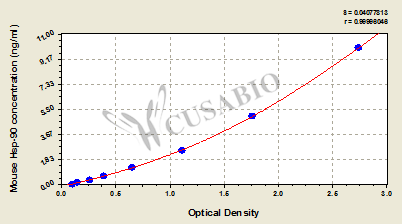
ng/ml OD1 OD2 Average Corrected 10 2.773 2.787 2.780 2.665 5 1.842 1.740 1.791 1.676 2.5 1.105 1.164 1.135 1.020 1.25 0.668 0.673 0.671 0.556 0.625 0.398 0.403 0.401 0.286 0.312 0.282 0.266 0.274 0.159 0.156 0.159 0.152 0.156 0.041 0 0.112 0.118 0.115 -
数据处理:
-
货期:3-5 working days
引用文献
- Reduced irradiation exposure areas enhanced anti-tumor effect by inducing DNA damage and preserving lymphocytes H Chen, Y Li, Q Shen, G Guo, Z Wang, H Pan, M Wu,Molecular Medicine,2024
- Chrysin and chrysin-loaded nanocarriers induced immunogenic cell death on B16 melanoma cells Y Oliyapour,Medical oncology,2023
- ZIP4 Promotes Muscle Wasting and Cachexia in Mice With Orthotopic Pancreatic Tumors by Stimulating RAB27B-Regulated Release of Extracellular Vesicles From Cancer Cells Yang J, et al,Gastroenterology,2019
- Tumor induces muscle wasting in mice through releasing extracellular Hsp70 and Hsp90 Zhang G.et al,Nat Commun.,2017
- The heat shock protein 90 inhibitor, 17-AAG, attenuates thioacetamide induced liver fibrosis in mice Abu-Elsaad NM.et al,Abu-Elsaad NM,2016
- Heat shock protein 90 associates with Toll-like receptors 7/9 and mediates self-nucleic acid recognition in SLE Saito K et al,Eur J Immunol,2015
- Tumor-suppressive effect of a telomerase-derived peptide by inhibiting hypoxia-induced HIF-1a-VEGF signaling axis Kim BK et al,Biomaterials,2014
相关产品
靶点详情
-
功能:Molecular chaperone that promotes the maturation, structural maintenance and proper regulation of specific target proteins involved for instance in cell cycle control and signal transduction. Undergoes a functional cycle that is linked to its ATPase activity which is essential for its chaperone activity. This cycle probably induces conformational changes in the client proteins, thereby causing their activation. Interacts dynamically with various co-chaperones that modulate its substrate recognition, ATPase cycle and chaperone function. Engages with a range of client protein classes via its interaction with various co-chaperone proteins or complexes, that act as adapters, simultaneously able to interact with the specific client and the central chaperone itself. Recruitment of ATP and co-chaperone followed by client protein forms a functional chaperone. After the completion of the chaperoning process, properly folded client protein and co-chaperone leave HSP90 in an ADP-bound partially open conformation and finally, ADP is released from HSP90 which acquires an open conformation for the next cycle. Plays a critical role in mitochondrial import, delivers preproteins to the mitochondrial import receptor TOMM70. Apart from its chaperone activity, it also plays a role in the regulation of the transcription machinery. HSP90 and its co-chaperones modulate transcription at least at three different levels. In the first place, they alter the steady-state levels of certain transcription factors in response to various physiological cues. Second, they modulate the activity of certain epigenetic modifiers, such as histone deacetylases or DNA methyl transferases, and thereby respond to the change in the environment. Third, they participate in the eviction of histones from the promoter region of certain genes and thereby turn on gene expression. Binds bacterial lipopolysaccharide (LPS) and mediates LPS-induced inflammatory response, including TNF secretion by monocytes. Antagonizes STUB1-mediated inhibition of TGF-beta signaling via inhibition of STUB1-mediated SMAD3 ubiquitination and degradation. Mediates the association of TOMM70 with IRF3 or TBK1 in mitochodria outer membrane which promotes host antiviral response.
-
基因功能参考文献:
- The study shows that a conserved tryptophan in the middle domain senses the interaction of Hsp90 with a stringent client protein and transfers this information via a cation-pi interaction with a neighboring lysine. PMID: 29662162
- Fusion of human SGT1 (hSGT1) to NOD1 LRR significantly enhanced the solubility, and the fusion protein was stabilized by coexpression of mouse Hsp90alpha. PMID: 27591899
- The major capsid protein of the mouse polyomavirus VP1 binds microtubules, HSP90, promotes their acetylation and blocks the host cell cycle. PMID: 27885808
- Artificially maintaining Hsp90alpha or knocking down Aarsd1L expression interferes with the differentiation of C2C12 myotubes. PMID: 26884463
- Immune-mediated destruction of ovarian follicles associated with the presence of HSP90 antibodies. PMID: 25653208
- identify that Hsp90alpha at the transition neck region represents a signalling platform on which IRS-1 interacts with intracellular downstream signalling molecules involved in IGF-1 receptor signalling. PMID: 25359884
- The study demonstrated that HSP90alpha plays an important role in the biogenesis of fetal PIWI-interacting RNAs (piRNA), which act against the transposon activities, in mouse male germ cells. PMID: 25262350
- deficiency does not affect immunoglobulin gene hypermutation and class switch but causes enhanced MHC class II antigen presentation PMID: 22855849
- study identified the essential role of Hsp90 in iNOS gene transactivation PMID: 21430289
- Hsp90alpha may be required to maintain and to activate these regulators and/or to disassemble the synaptonemal complex that holds homologous chromosomes together PMID: 21209834
- extracellular Hsp90alpha promotes angiogenesis in an MMP-2-dependent manner. PMID: 20937816
- Hsp90-ovalbumin peptide complexes bind to scavenger receptor expressed by endothelial cells (SREC-I) on the surface of antigen presenting cells. PMID: 20686127
- Endogenous HSP90 is essential for cross-presentation of both soluble and cell-associated antigens in dendritic cells. PMID: 20668218
- KLF4 inhibition by antisense oligonucleotides markedly decreased the constitutive expression of HSP90 (HSP84 and HSP86). PMID: 19669938
- Following exposure to elevated temperatures, higher amounts of Hsp90alpha are inside the nucleus, but not within the nucleoli. PMID: 12713799
- Heat shock protein 90 is an endogenous protein enhancer of inducible nitric-oxide synthase PMID: 12855682
- by induction of HSP90A c-Myc may control the activity of multiple signal pathways involved in cellular transformation PMID: 14724288
- HSPB1 pathway is important during trophoblast stem cell differentiation PMID: 17267699
- Hsp90 promotes activation of the Fanconi anemia pathway through regulation of intracellular turnover and trafficking of FANCA PMID: 17327415
- Unlike Hsp90beta, Hsp90alpha is not associated with regulation of the antiapoptotic response of immune cells. PMID: 17475835
- Blocking Hsp90 disrupts IGF-I and IL-6-induced proangiogenic signaling cascades by targeting IGF-IR and STAT3 in pancreatic cancer PMID: 17975158
- These results demonstrate a substantial role for hsp90 in chaperoning of antigenic peptides in direct and indirect presentation. PMID: 18216248
- Melusin directly binds to Hsp90, a ubiquitous chaperone involved in regulating several signaling pathways. PMID: 18474241
- mammalian Unc45b is a cytosolic protein that forms a stable complex with Hsp90, selectively binds the unfolded conformation of the myosin motor domain, and promotes motor domain folding PMID: 18478096
- A possible role of Hsp86 in mouse suprachiasmatic nucleus is association with circadian rhythms. PMID: 18480550
- Hsp90 regulates cPLA(2)alpha-mediated arachidonic acid release that involves association of a p54 kinase with cPLA(2)alpha upon okadaic acid stimulation PMID: 18550790
- hsp90 facilitates MHC class I antigen processing through epitope production in a complex of the 26 S proteasome PMID: 18703510
- the complex role played by Hsp90 in regulating signal transduction pathways in normal tissues as well as in cancer cells. PMID: 18840695
显示更多
收起更多
-
亚细胞定位:Nucleus. Cytoplasm. Melanosome. Cell membrane. Mitochondrion.
-
蛋白家族:Heat shock protein 90 family
-
数据库链接:
Most popular with customers
-
Human Transforming Growth factor β1,TGF-β1 ELISA kit
Detect Range: 23.5 pg/ml-1500 pg/ml
Sensitivity: 5.8 pg/ml
-
-
-
Mouse Tumor necrosis factor α,TNF-α ELISA Kit
Detect Range: 7.8 pg/ml-500 pg/ml
Sensitivity: 1.95 pg/ml
-
-
-
-



